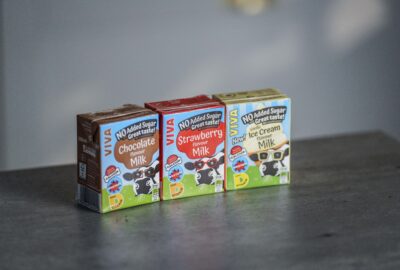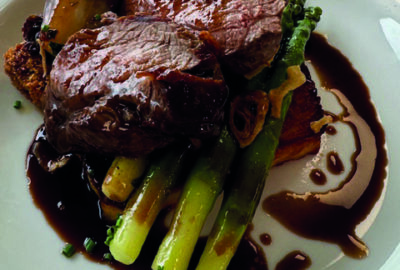Innovative ideas to maximise the Afternoon Tea Week opportunity
Afternoon Tea Week takes place from August 12-18, offering an ideal opportunity to promote and showcase your offering. This national institution dates back to the early 1840s, when it evolved as a mini meal to fill the gap and stem the hunger of the evening meal. It was during a visit to Belvoir Castle in the mid-1840s to see the wife of 5th Duke of Rutland, Elizabeth Manners, that Anna Russell, Duchess of Bedford, decided the wait until supper was simply too long!
Traditionally it comprised a range of finger sandwiches, sweet pastries and cakes, with scones with clotted cream and jam introduced later in the 20th century.
Nowadays, however, afternoon tea can be a much more lavish affair, with discerning operators looking for unique and imaginative ways to keep ahead of the competition.
Well bread
When it comes to sandwiches, many establishments are moving away from the ubiquitous ‘white sliced’ to increase the all-important ‘wow factor’; presentation is key but quality should never be compromised.
Simon Cannell, MD of Speciality Breads, says: “Afternoon tea appeals to all age groups from celebratory baby showers to centenary birthdays with all age points inbetween. Operators that are clearly outperforming in the marketplace are the ones that look to constantly improve their offering. We are supplying a lot of our mini breads to caterers looking for a point of difference. Our mini bread range includes mini ciabatta and two mini mixed roll selections.”
Take a bite
“Bite-sized versions of some of Britain’s favourite treats make the perfect addition to any afternoon tea display,” explains Gordon Lauder, MD of frozen
food distributor Central Foods. “Try including mini muffins – sweet or savoury – or mini doughnut balls. Both muffins and doughnuts are popular teatime treats and mini versions are sure to add interest to any afternoon tea menu.” Central Foods has a 10-strong range of ‘bitesized’ baked products to cater for increasing demand for smaller, indulgent treats. The KaterBake range includes mini doughnut balls and mini filled muffins – currently the only filled mini muffins available to foodservice.
“Using pre-prepared frozen cakes, bakes and other products helps caterers to serve their afternoon tea treats fresh every day, as well as helping to reduce waste,” adds Gordon.
The School of Artisan Food runs a ‘Make Your Own Afternoon Tea’ course with tutors Graham and Rose Dunton, who have produced patisserie for some of the world’s finest hotels and restaurants.
www.schoolofartisanfood.org/product/ make-your-own-afternoon-tea
Brew up
Tea is clearly an important component of the afternoon tea offering but, in the past, has been a bone of contention amongst consumers. Yorkshire Tea’s Campaign for a Proper Brew highlights consumer dissatisfaction with tea out of home, often due to cafés and restaurants using One Cup teabags, which contain less tea than standard-sized teabags and, consequently, make weaker tea. But it also reveals the proper profits that can be made by getting tea right.
The Yorkshire Tea survey, conducted in partnership with YouGov, surveyed over 2,000 people across the UK. Key findings from the report include:
44%of respondents named tea as their preferred hot drink at home, with just 31% opting for coffee. In contrast, when out of home, only 15% opt for tea the most, with 49% choosing to drink coffee instead
40%of tea drinkers said that the last cup of tea they drank out of home was worse than the tea they generally drink at home, with 13% saying that it was much worse
28%of those who have drunk tea out of home were not satisfied with the last cup of tea they were served in this setting
Despite traditional black teas still dominating the market at 81% of all out of home tea sales, habits have started to change from being confined to the classic cuppa.
“Perfect for the afternoon tea experience, you can expect to see a growing trend in speciality teas offered in high street locations, where customers can share both the social occasion and ceremony,” says Marshall Kingston, Tetley senior brand manager – out of home. “Fruit, green and herbal teas have shown a steady increase of 10% YOY 20172018. Where 32% of tea drinkers look to relax, but are willing to pay more for a premium brand out of home, speciality brews present the perfect opportunity to satiate guests and diners who want something a little different from tradition.”
Be Gentle
Men are getting in on the act when it comes to afternoon tea, with some canny operators creating bespoke offers just for gents.
The Mandeville Hotel in Marylebone, London, has done exactly that, with great success.
General manager Anshul Bose explains: “To complement the gentleman’s club style of Reform Social & Grill, it only seemed appropriate to create the first ever gentleman’s afternoon tea. Moving away from the classic British tradition, the tea should be enjoyed by all, so we decided to create a very manly affair with blue crockery and dishes including mini steak sandwiches, potted shrimp amongst other savouries, maintaining the classic scones reserved for an afternoon tea, accompanied with whisky.”
Afternoon tea with free flowing bubbles costs £39, the Gentleman’s Afternoon Tea with a glass of Moët & Chandon is £37 and Gentleman’s Afternoon Tea £26.50.
Fashionable ideas
According to thefoodpeople, leading hotels across Asia are pairing up with their counterparts in the fashion and beauty world to create limited edition afternoon tea sets that are a feast for both the eyes and the stomach.
“From floral cakes inspired by the season’s hottest fragrances to savoury bites inspired by the latest fashions on the catwalk, there’s only one rule here: the more creative, the better! The result is a series of ultra Instagram-worthy events, showcasing the delicious artistry that can arise when the food and fashion worlds come together.”
Go vegan
With the number of people following a vegan diet increasing by a staggering 542% in the last three years alone this provides an important consideration for caterers when crafting their Afternoon Tea Week menus.
“The classic loaf cake provides the perfect format for creating vegan varieties for Afternoon Tea Week and is a great way to showcase innovative flavour profiles,” advises Emma Haworth, senior brand manager, Dr Oetker Professional. “Simply replace traditional butter with a nut butter such as hazelnut, peanut or almond and instead of eggs use coconut cream or hazelnut milk to produce a light and moist cake. “Like the traditional base of eggs, flour and sugar for cakes, once you have a mastered a vegan alternative you can start adding in a variety of different flavour combinations such as orange, hazelnut and caramel or apple, cinnamon and ginger – the possibilities really are endless!”
Maggie Lister, roving chef at Vegetarian for Life, offers these tips for preparing a vegan afternoon tea:
1) Swap butter for plant-spreads such as Vitalite and Pure, and when baking use bananas, flax seed or ‘No-Egg’ in place of eggs.
2) A lot of FreeFrom flours have a gritty texture but one way of avoiding this is to let cake batters stand for a minimum of 30 minutes before baking as it allows the flour to absorb moisture.
3) If you’re making pastry, a delicate hand is needed as they can easily fall apart, so try rolling the pastry in between two pieces of clingfilm.
Try Serving:
- Cucumber Sandwiches
- Spiced chickpea and mango wraps
- Smoked carrot lox with vegan cream cheese
- Vegan scones with jam, spread and cashew nut cream
- Chocolate and beetroot brownies https://vegetarianforlife.org.uk/recipes/cakes-and-puddings/beetroot-chocolate-brownies
- Victoria sponge Miniature Bakewell tarts https://vegetarianforlife.org.uk/recipes/cakesand-puddings/strawberry-bakewell-tart
- Miniature meat-free sausage rolls
- Creamed mushroom vol au vents https://vegetarianforlife.org.uk/resources/publications/take-v
- Miniature bruschettas with olive tapenade
Theme it
Themed afternoon teas have been circulating hotels for a while but with many now being seen as an event, they’re becoming more immersive and experiential than ever.
The K West Hotel recently launched a Retro Afternoon Tea with sweet treats of yesteryear taking centre stage. Savouries include Mini Prawn Cocktails spiked with Jack Daniel’s Whiskey; Mini Beef Sliders with BBQ sauce & cheddar; and Mini Halloumi Sliders with sundried tomato & guacamole. The creative new afternoon tea also includes Black Forest Roulade filled with chocolate truffle and cherries; Yuzu infused Meringue Lolly torched meringue and white chocolate; and Bubblegum Macaron.
Care
Care sector
Afternoon Tea Week provides the perfect opportunity for care home caterers to fortify their menus. Paul Chmielewski, head of marketing, Lakeland Dairies, comments: “We know it can be a daily struggle to meet the dietary and nutritional needs for those living with dementia, whilst also catering for special diets and ensuring residents get all their essential calories and vitamins. That’s why we’re committed to supplying products such as Millac Gold Double to help fortify a host of dishes ideal for afternoon teas.”
Dysphagia (difficulty swallowing) is another common challenge for care caterers and Sam Rain, HB Ingredients development chef and UK Sosa Ambassador, has created a full afternoon tea for dysphagia sufferers including sandwiches, biscuits and scones with jam.
Sam said: “With dysphagia it’s important that the dish is pleasing on the eye and looks like a ‘normal’ meal or dessert. Using some of the Sosa products it’s possible to recreate afternoon tea, with amazing flavours and all the finery you’d expect from a top hotel.
“For example you could use Gelcrem to help replace prescribed thickeners, providing nutrients and heightening the sense of flavour of the dish, the gel also works well in a mould, allowing you to recreate the original form of the dish.”



